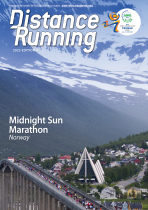Opinion
08 January 2013, 8am UTC
Modern day marathon messengers
Picking up my race number before the Athens Classic Marathon, I got talking to Dave, who was about to run his 200th marathon. He was part of the UK 100 Marathon Club, many of who have run hundreds of marathons. That conversation turned my understanding of marathon running upside down. I asked him if anyone had written about ‘you people’. He said they hadn’t, and some might be worried they would be labeled as crazy.
So I ended up writing a book called ‘The Messengers’. I interviewed more than 100 of them from different countries. Far from being crazy, I think that we can all learn from these messengers.
Dave Major has since gone on to run 500 marathons, averaging over 50 in each of the past seven years. He and his wife Linda, who has run over 300 marathons, run somewhere almost every weekend.
It’s their passion, their social network, their commitment to health. It’s what makes them happy. And there are 100 Marathon clubs in North America, Australia, New Zealand, Japan, Germany and several other European countries. Yet more people have climbed Mt. Everest than have run 100 marathons.
Some have completed several hundred; a few of them more than a thousand. The numbers can become, simply, numbing. If you were to start running a Marathon every couple of weeks it would take you 40 years to do 1000 of them. If we want insights into long distance running and what it means for our spirit – for the human soul – who better to ask than these messengers?
The word Messenger dates back to ancient times when there was no email, text messaging or Twitter. The great messenger of the gods in Greek mythology is Hermes, the patron of boundaries and travelers and also the patron of athletics. He delivers messages from Olympus; his shoes have wings so he can move between the mortal and immortal worlds. He shares his messenger role with another god, Iris. She is represented as either a rainbow or as a young girl with wings on her shoulders.
In the real world the ancient Greeks used hemerodromoi (all day messengers) to deliver important messages across the countryside. The Greek philosopher Socrates said he wished he could keep up with the hemerodromoi. Pheidippides was the best known of them, bearing his legendary message of victory to the Athenians, although there were many others.
The hemerodromoi were professionals – they never competed in running events but they served as essential communication links. Over difficult terrain they were more effective than horses and would be present when the message was delivered, which allowed for interpretation and discussion if required. Upon their return they could comment on how the message was received: who read the message, the extent of emotion, facial expressions and so on. In many respects there were considerable advantages over email.
The Messengers I wrote about are modern day Messengers. They are inspiring, passionate and committed: transforming lives and overcoming adversity. In making distance running a lifestyle they have a message for us all.
Running more than 100 long distance races is not for everyone but those who have done so have definitely found something we all would like to have.
First, they are happy; especially happy when they are out experiencing their passion. And happy, despite the adversities faced and the challenges they have had to overcome.
Second, they are healthy in the broadest sense of the word: physically, mentally, emotionally, spiritually, socially. They are resilient, tenacious and positive. An American, Norm Franks, recovering from a stroke after having finished 965 marathons told me that he will complete 1000 of them even if he has to use a walker.
Norm embodies so much of what it’s all about. If I had been a 10-year old listening to Norm and being given one of his medals he would have changed my life just like that. The messengers inspire; they give back. They are role models who have profound effects on others through their smallest actions and their quietest comments.
To me, the messengers bear 12 key messages:
- The rewards of long distance running include greater self-respect, greater respect for others and greater levels of confidence.
- Happiness can flow from one of the most fundamental of human activities.
- Running long distances builds strong social networks which contribute to the happiness of all concerned.
- Physical activity contributes to building happiness and our emotional, spiritual, and mental well-being. As research shows, being happy is addictive.
- The emotional, spiritual, mental and physical well-being derived from running long distances creates a level of contentment; a sense of being unworried.
- It is possible to overcome adversity; never give up.
- It is possible to transform your life.
- Achieving goals positively contributes to a ‘can-do’ attitude that embraces life and its infinite possibilities. Failure is only failure if one never tries.
- Believe in yourself; have courage; anything is possible.
- Inspire.
- Be inspired.
- Enjoy what you do.
Professor Richard de Witt comments in the book Philosophy and Running: “In the Hellenistic concept [of apathy] one does not merely have apathy; rather, one acquires it. Acquiring apathia can be a long, involved process. One cannot acquire apathy without first having pathos, that is, without first being passionate. One must work, and work passionately to understand the universe and to understand one’s place in that universe … It is this deep understanding that leads to peace of mind, to mental tranquility, mental unperturbedness … one’s passion eventually leads to apathia, the right sort of apathy – an unworried state of mind.”
A recurring theme when talking to the Messengers is their sense of the unworried, both during their runs and in their everyday lives. It is as if they are well on the road to Apathia, or maybe have already got there.
All marathoners inspire in some way. By achieving what they set out to do, by enduring, they transform lives. The act of pushing their limits can be enough to inspire children to run, and adults to get up and get moving. In this age of inactivity, chronic disease and rising rates of obesity, the modern day long distance runner is a role model for effecting positive change in society.
The messengers’ positive outlook on life reinforces their resolve to seek new knowledge about themselves and others. By reducing the social distance between other runners and non-runners alike, they further expand their knowledge of the world. They seek new knowledge about the places they visit; they are in search of people, adventure, and experience.
The pursuit of new experiences and the knowledge conferred by them is addictive. It builds confidence and contributes to that unworried state of mind; that deeper understanding of the universe and our place in the universe.
Movement is life. Being active sends us back in evolutionary time and to when we were better attuned to the world in which we live. The messengers experience that as they journey along the road to apathia with their mind, spirit and body as one.
The messengers have found a place that perhaps we all need to reach. Through their passionate pursuit, unknowingly on the road to apathia, their world makes perfect sense, and they are the better for it.





